By Lucy Komisar
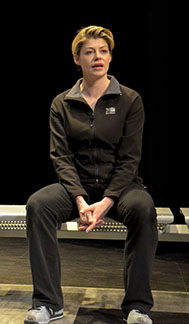
There‘s nobody better than the Brits to do plays about class. And in this case, also male/female. Ayckbourn, who is 77, gets it. I think he always has.
These three very different plays at 59E59 Theaters all deal with personal crises, but do them as a thriller, a melodrama and a farce. Not bad. And they use Ayckbourn‘s theatrical tricks to do reversal/mirror image and time shifts. We see things happening from different viewpoints and in different times. And we have the good fortune that the plays are directed by the master himself, with just the right bits of sorrow, tragedy, comedy, silliness.
In Arrivals and Departures, the most powerful play, Ez (a terrific Elizabeth Boag), is a soldier assigned to protect Barry (also brilliantly played by Kim Wall), a provincial traffic warden who has been brought to London to identify a terrorist who is expected to arrive at the train station.
There is some comic stuff when the jerky head of the operation (Bill Champion) tried to direct his troops to pretend to be locals at the waiting room. But the moving story is the imaginings of Ez and Barry who sit on waiting room benches and think about their past lives.
For Ez, it‘s the sorrow of her father dying in war, her joining the military, being wooed and then raped by her lover. We see the events happen in her memory. She remains cool, restrained, never opening up.
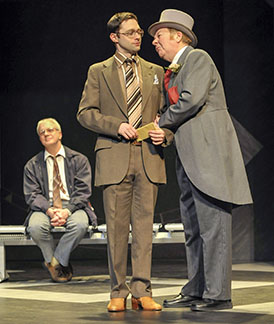
Barry is warm, sympathetic and gregarious. But Ayckbourn‘s surprise is that in the second act, there‘s a reversal, we see the life that Barry led. James Powell is the young man. We hear the same outer dialogue of the two in the waiting room, but different visions.
This nice guy Barry had a shrewish wife (Sarah Stanley). When their daughter puts her head in his lap, the wife complains, “She‘s greasing your suit.
After working 18 years for his father-in-law, Barry takes over the business and is destroyed by an embezzler. His wife cheats on him and leaves him. But the smile never leaves his face.
The stunning aspect of the play is that both characters coolly hide their tragedies. And even though on the face they appear so different, they share the same lot as victims of personal tragedy.
Time of My Life
Ayckbourn again plays with time in this multiple dinner event. The stage is divided in three, with the main table for the present, another moving to the future and a third moving from present to past.
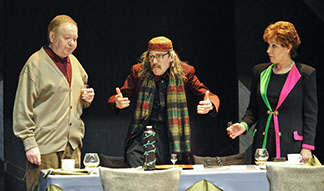
Gerry (Russell Dixon) and Laura (Sarah Parks) are having a party to celebrate her 54th birthday. Things are not going to go well. In fact, the best part is the wonderful waiter (Ben Porter), or waiters, who appear, all played by Porter, variously in broken Italian, Croatian (maybe) and other accents, perhaps also Greek.
As time passes, all the bad stuff comes out. Son Adam (James Powell) has brought tacky Maureen (Rachel Caffrey), a working-class young woman in a rhinestone jacket whose getup and demeanor make Laura sniff. (The play is also about class.) At a small table stage front-left, we go back in time to see how Adam and Maureen met.
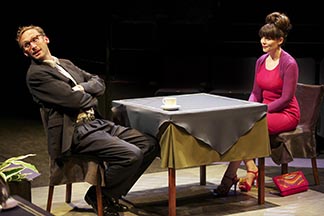
Son Glyn (Richard Stacey) is with wife Stephanie (Emily Pithon) and at their table stage front-right, we go forward in time to see that he has left her for another woman. Ayckbourn‘s jokey device is that Glyn repeatedly arrives to meet her for lunch and is always late.
A common theme is betrayal. But in each case, relationships shift, and the partner who appeared on the short end turns out better off.
Farcicals
This is the lightest of the three, but is still Ayckbourn-clever.
Two neighboring small-town couples have garden party/barbecue dinners. There are two plays. The first (Chlo« with Love”) is a boy-boy girl-girl friendship thing and the second (“The Kidderminster Affair”) is a boy-girl – well, you get the idea.
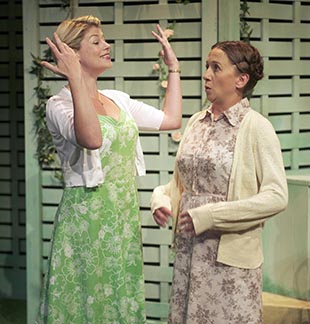
They are silly and funny. And quietly truthful.
Lotte (a terrific Sarah Stanley) thinks her husband Teddy (Bill Champion) is straying. So her friend Penny (Elizabeth Boag) wants to make her up. In fact, she does an excellent job.
Meanwhile, Teddy and Reggie (Kim Wall), two boring guys, are carrying on about wine. One says the wine they are drinking is “like almonds with a hint of coconut.” Or maybe “pistachios with a hint of prune and walnut.” And then the comment, “It mystifies me how women can chatter on.”
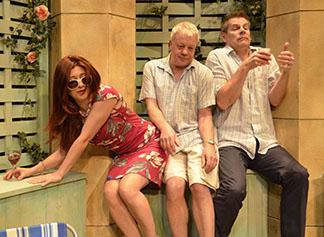
When Lotte arrives in her makeover, neither man recognizes her. The men act like men – both coming onto her — and comedy ensues. Stanley is a funny chatterbox. Ayckbourn is the only guy who can write a non-erotic sex scene with a man and a woman rubbing each other‘s derri¨res.
The second piece has the same people but in this case two characters not married to each other are having a secret affair. How they cover it up and how the betrayed wife (but not the cuckolded husband), figures it out is prime comedy.
Ayckbourn’s splendid slapstick in this case involves a food fight. He is a masterful playwright who shouldn‘t be missed by those of us on the other side of the pond.
“Ayckbourn Ensemble.” Three plays written and directed by Alan Ayckbourn. 59E59 Theaters. 212-279-4200. Opened June 4, 10 and 11, 2014; closes June 29, 2014. 6/24/14.

